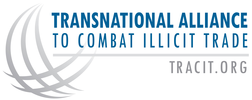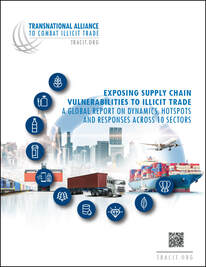KEY FINDINGS
Illicit Organized criminal groups (OCGs) exhibit remarkable versatility in engaging in illicit trade across the sectors under review, demonstrating sophistication in sourcing/transportation/distribution practices and infiltrating all stages of supply chains. The COVID-19 pandemic presented both challenges and opportunities for OCGs. While it disrupted illegal supply chains, it also diverted law enforcement focus away from illicit trade.
Domestic legal frameworks for prosecuting illicit traders remain inconsistent, with penalties often lacking deterrence, which in turn encourage traffickers to continue operating in low-risk, high-reward environments. Some OCGs involved in illicit trade in the sectors under review also participate in narcotics trafficking, terrorist financing, and armed conflicts – fueling political instability and raising heightened security concerns. Corruption plays a central role in facilitating illicit trade across all sectors reviewed. Countries with burdensome regulations, weak institutions and thriving unofficial economies are particularly susceptible to high levels of corruption. Developing countries often experience increased levels of corruption due to, inter alia, low remuneration for officials responsible for combating illicit trade. Corruption can occur at almost any point in supply chains, involving public officials such as customs/border police officers. Regulatory/inspection agencies may also be involved. Corruption's global cost in the forestry sector, for example, is estimated at $29 billion annually, with government officials manipulating documents to make illegal timber appear legal. Insiders, including company employees, have been found to collude with traffickers in sectors such as oil and pharmaceuticals. Money laundering allows traffickers to distance themselves from their illegal profits by tactics such as introducing proceeds into the legal economy, reinvesting in the same illegal business, or engaging in new illicit trade practices. To obscure money trails, traffickers often rely on the services of white-collar intermediaries who craft complex financial structures. Cash-intensive sectors like fishing and illicit oil markets facilitate money laundering schemes as well as informal remittance systems - like Hawala. Precious gems are also used for laundering purposes due to the intrinsic characteristics of these commodities and their susceptibility to value manipulation. Illicit trade fosters a disturbing demand for forced labor due to its pursuit of profit through use of a cheap or even unpaid workforce often made up of vulnerable groups such as children, women and illegal migrants. Forced labor is prevalent across various illicit sectors, from agriculture and minerals to counterfeit goods manufacturing. |
DOWNLOAD THE FULL REPORT |
|
Transnational Alliance to Combat Illicit Trade (TRACIT) is an independent, non-governmental, not-for-profit organisation under US tax code 501(c)(6).
© COPYRIGHT 2024. ALL RIGHTS RESERVED. |
Follow us
|

